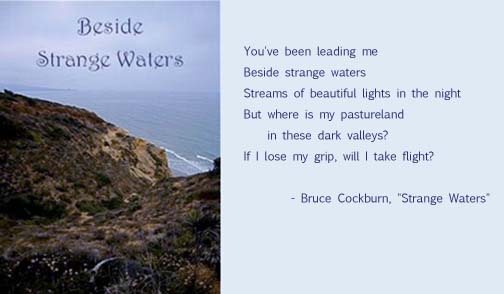Whatever you do in word or deed, do all in the name of the Lord Jesus, giving thanks through Him to God the Father (Col. 3:17, NASB).and
Whether, then, you eat or drink or whatever you do, do all to the glory of God. (1 Cor. 10:31, NASB).When I was a kid, that stuff seemed pretty lame to me. I didn't want anything to do with dying to self or glorifying somebody else. Well-meaning adults told me that "the chief end," or purpose, "of man" (i.e., all humankind) was "to glorify God," but unfortunately they left off the most important part of the quote:
Man's chief end is to glorify God, and to enjoy him forever" (Westminster Shorter Catechism, emphasis mine).Later, I learned that God was meant to be enjoyed, and that our lives were meant to be enjoyed as well:
Here is what I have seen to be good and fitting: to eat, to drink and enjoy oneself in all one's labor in which he toils under the sun during the few years of his life which God has given him; for this is his reward.I have also discovered that true pleasure does not exist in isolation, but through relationships. As people, we were meant to live in community (what Scripture calls the Body of Christ). As you know from your own experience, people don't really enjoy life without friendship and connection. Hence, the two Great Commandments to love God and to love our neighbor (Matt. 22:37-40).
Furthermore, as for every man to whom God has given riches and wealth, He has also empowered him to eat from them and to receive his reward and rejoice in his labor; this is the gift of God (Ecclesiastes 5:18,19, NASB).
Blogging, reading, writing - whatever we do with our time - ideally will bring something of hope and joy to us, and to those around us. I personally want to be an encouragement to others, and I want my writing to bring some strength, or knowledge, or wisdom to somebody besides myself.
As a writer, lover, friend and follower of Jesus, I am no different from a physician: if I can't do good, at the very least, I must not do harm (Hippocratic Oath). And I hope, whatever befalls me, that I will not forget about delight.
Links
Lyrics, "Don't Forget About Delight" by Bruce Cockburn
The Joy of the Lord is My Strength Piano Solo (pretty trippy piano playing for an old guy)
The Joy of the Lord is My Strength - Asaph Borba
By Angela ~ The Joy of the Lord is My Strength - you'll love this beautiful, acoustic song
Westminster Shorter Catechism (I learned a somewhat more modern version of this when I was fifteen)
